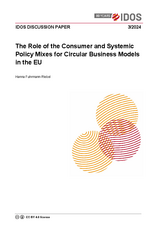The role of the consumer and systemic policy mixes for circular business models in the EU
Fuhrmann-Riebel, HannaDiscussion Paper (3/2024)
Bonn: German Institute of Development and Sustainability (IDOS)
ISBN: 978-3-96021-228-7
DOI: https://doi.org/10.23661/idp3.2024
Preis: 6 €
Recent decades have shown an unprecedented growth in demand for resources, with a trend that is projected to accelerate in the future. Policymakers around the world have started to recognise that transitioning to a more resource-efficient and circular economy (CE) is key to addressing this challenge. Two important enablers for the transition to a CE are circular business models (CBMs) and consumers. The two are interlinked, as demand shifts among consumers can foster the development and supply of new business models, which in turn require the uptake by consumers to be successful. To promote the development and increase the uptake of new CBMs, policymakers need to provide the respective regulatory frameworks and incentives. Doing so requires systemic policy mixes that go beyond encouraging technological innovations and include targeting the demand side as well. This paper zooms in on the role of the consumer for CBMs, discusses potential consumer barriers to CBM demand, and outlines how policy-making can address these barriers by applying systemic mixes of instruments to tackle the macro-, meso-, and micro-level factors that influence consumer demand simultaneously. While the macro-level describes the economic context of consumers’ decision-making, that is, the availability and supply, infrastructure and price of CBMs in the market, the meso-level characterises the social environment, including social norms and social status, whereas the micro-level focuses on individual characteristics such as consumption habits, security and quality concerns, and environmental knowledge or concern. This paper illustrates how the different consumer barriers are closely interlinked, and that, ideally, policymakers should target all three levels jointly to encourage CBM demand most effectively. In doing so, policymakers should consider the principles of the waste hierarchy in order to maximise the environmental benefits of CE policy mixes. The paper mostly takes a European perspective on the topic, especially when discussing relevant policy frameworks, and reflects on potential differences to other regions, particularly in the Global South, when appropriate


